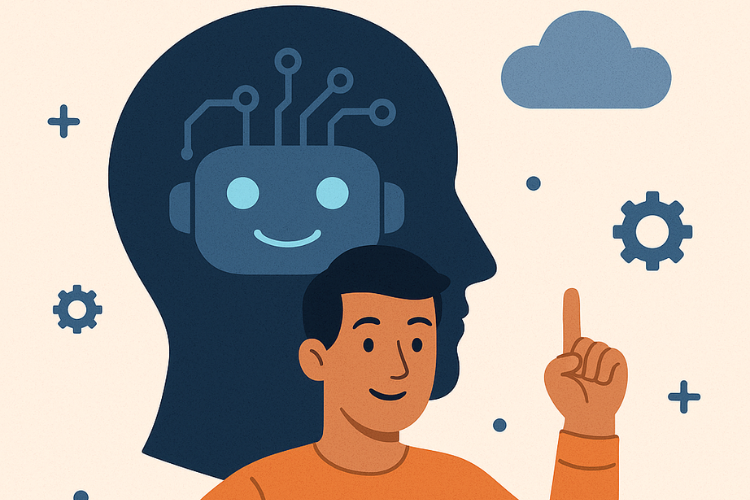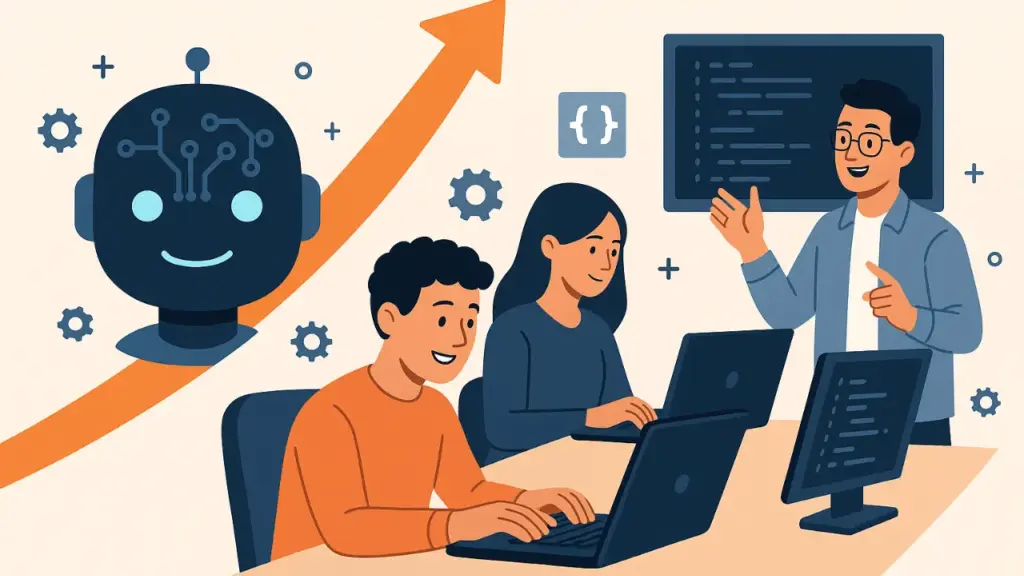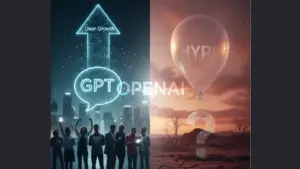Introduction
Everyone’s talking about how AI is going to take over software development. Job losses. Team cuts. A shrinking future for developers. But what if they’re wrong?
After 25 years in this industry, I’ve seen similar fears before. People claimed compilers would make coders obsolete. Then low-code platforms. Then mobile frameworks. None of them killed jobs. In fact, demand for software engineers only grew.
This time, I believe it’s no different. And top tech leaders are finally admitting it. AI won’t replace developers. It will supercharge them. If you position yourself right, the next five years could be the biggest opportunity of your career. Let’s explore why this belief is more than just optimism.
The Misguided Fear Around AI and Developer Jobs
The fear that AI will make developers irrelevant spread fast. Sensational headlines fueled the panic. Social media amplified it. Some CEOs even suggested teams could shrink because of AI.
But let’s take a step back. Every major tech leap has triggered similar fears. In the end, those technologies created more jobs than they replaced.
Why? Because new tools unlock new possibilities. As businesses see what’s now possible, they need more engineers to build, integrate, and scale. Innovation has always followed technological advancement, and people — especially engineers — remain critical to that process.
AI is no different. It speeds up parts of the process. But the need for creative, human-driven problem solving hasn’t gone anywhere.
There’s also the matter of context. AI can generate code, but it doesn’t fully understand business goals, client expectations, or user experience. Developers provide the bridge between business needs and technical execution.
What Tech Leaders Are Now Saying
Okta CEO Todd McKinnon recently called the idea of needing fewer software engineers in the future “laughable.” He told Business Insider that every wave of tech advancement has led to more jobs, not fewer.
McKinnon explained how compilers, mobile devices, and cloud platforms all increased demand. AI will do the same.
And he’s not the only one.
Sam Altman, the CEO of OpenAI, once said AI might replace developers. Now, he claims it will make them “10x more productive.”
Even Bill Gates has admitted the field of software engineering is too complex for AI to handle alone. Human oversight, creativity, and judgment remain essential.
This is a massive shift in tone. And it’s coming from the very people building these tools. It’s important to note that when insiders change their narrative, it’s often a signal that the practical realities are becoming clear. Leaders see that software isn’t just about writing code — it’s about solving unique problems.
History Repeats Itself — Tech Never Kills Dev Jobs
Let’s look at history.
- Compilers: In the 1950s, some feared that compilers would remove the need for programmers. Instead, they opened up programming to millions more. The same happened with higher-level languages like Python and JavaScript.
- Low-code tools: Marketed as ways to build apps without developers. Instead, they created new developer jobs to support, scale, and secure those platforms. Enterprises needed experts to manage integration, data flow, and long-term maintenance.
- Mobile revolution: New devices meant new ecosystems. Developers flooded in to build apps. Demand skyrocketed. Even simple apps required skilled backends, testing, and user support.
- Cloud computing: This was supposed to simplify infrastructure. In reality, it created demand for DevOps engineers, site reliability engineers (SREs), and architects.
In every case, technology made development easier. That didn’t shrink the job market. It expanded it. Efficiency improvements always lead to increased expectations and innovation, not redundancy.
Why Developer Jobs Will Surge in the Next 5 Years
Here’s why I believe we’re about to see an explosion in software development jobs.
1. AI is an accelerant, not a replacement
AI can write code. But it still needs human input, supervision, and context. Developers won’t disappear. They’ll shift roles — from coding every line to designing, guiding, and refining AI output. It’s similar to how architects use CAD software — the tools help, but expertise still drives results.
2. Software demand is growing across industries
Every company is now a tech company. From finance to farming, software is critical. As AI unlocks faster development, more companies will pursue digital products. That means more developer jobs. Think about automation in retail, logistics, education, and healthcare — all require custom software built by humans.
3. AI tools need integration and customization
AI platforms aren’t plug-and-play. Businesses need engineers to fine-tune, adapt, and secure these tools. Each implementation is different. Regulations, compliance, security, and user data privacy all require thoughtful, tailored solutions.
4. New job roles are emerging
Prompt engineers. AI trainers. Tooling specialists. As AI grows, entirely new categories of developer work are being created. Companies need people who understand both AI capabilities and traditional software development.
5. Human creativity still drives innovation
AI lacks originality. It can replicate patterns, but not invent new ones. Developers who innovate will remain irreplaceable. Software design, user experience, and ethical decision-making are human domains for the foreseeable future.
6. Maintenance and debugging still require human expertise
AI-written code isn’t perfect. Bugs, misinterpretations, or edge cases will still arise. Developers will spend more time refining and debugging than ever before, especially when AI is involved.
7. AI needs to be monitored and evaluated
Companies using AI must assess whether it’s functioning as intended. Monitoring performance, validating outcomes, and identifying bias or inefficiencies all fall on engineering teams.
How You Can Position Yourself for the AI-Powered Future
The opportunity is massive. But you need to evolve. Here’s how to prepare:
1. Master AI-assisted development
Get comfortable using tools like GitHub Copilot, ChatGPT, and Tabnine. Learn how to guide AI output, not just accept it. Practice editing AI code to align with best practices.
2. Learn prompt engineering
Knowing how to ask the right questions and give the right instructions is becoming a core skill. Learn how to structure queries and refine prompts for better output.
3. Focus on architecture and design
AI can write functions. But only humans can design scalable systems. Strengthen your understanding of software architecture. Dive into system design, API planning, and security architecture.
4. Stay adaptable
The tech landscape is changing fast. Learn continuously. Pick up new frameworks, tools, and methodologies. Follow industry blogs, attend webinars, and participate in dev communities.
5. Build projects that solve real problems
Don’t just follow tutorials. Build solutions. Real-world projects sharpen your skills and make you stand out. Focus on things that offer real business value, not just cool tech.
6. Learn about ethical AI and data responsibility
Developers will play a key role in shaping responsible AI. Understand how to handle data, reduce bias, and build inclusive systems.
7. Develop soft skills
Communication, teamwork, and project management are more important than ever. Developers must collaborate with stakeholders and help translate business needs into technical goals.

Conclusion
AI won’t end software development. It will redefine it. The next five years will bring new tools, new challenges, and new roles. But at the core, developers will still drive the future.
The key is adaptation. Those who embrace AI will rise with it. This isn’t the end of an era — it’s the beginning of a new one.
At StartupHakk, we’re focused on helping developers grow, adapt, and thrive in this new era. Stay curious. Stay sharp. And most of all, stay in the game. The best time to be a developer is now.




